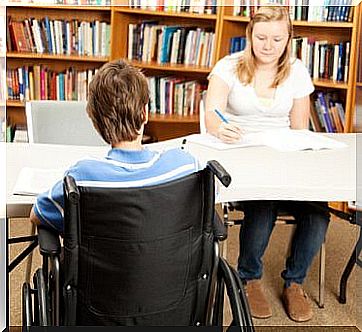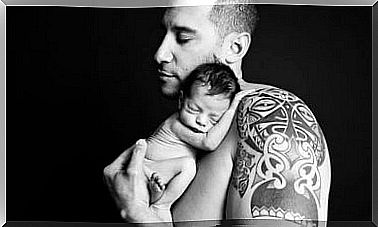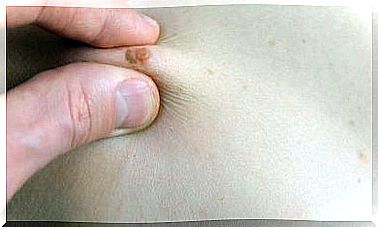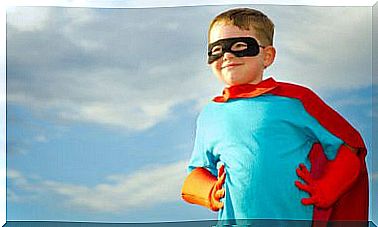Intellectual Disability In Children
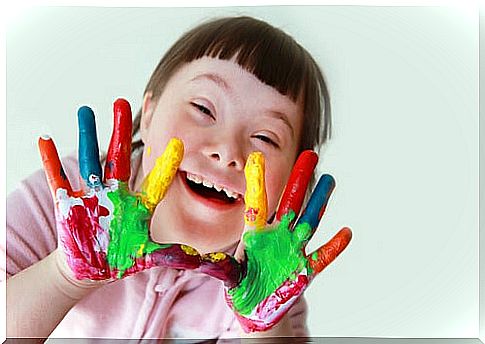
Intellectual disability in children is a condition that slows down the learning and development of the person. Cognitive dysfunction can be identified from birth by the presence of certain abnormalities. In most children, however, symptoms become apparent at preschool age.
There are no differences between intellectual disability in children and adults. In general, it implies a series of difficulties to carry out daily tasks.
Affected people need more time and support than others to walk, dress, function or interact at home or in other spaces. Perhaps the first thing you notice is your difficulty speaking, putting words together, or formulating complete sentences.
Intellectual disability is not a mental health disease or disorder; therefore, it is not cured. However, with proper treatment, a boy with this condition can improve his quality of life physically, socially and at work. Ideally, you should receive an education according to your needs.
Causes of intellectual disability
Intellectual disability can be generated by various factors:
- Genetics. Hereditary disorders such as neurofibromatosis, hypothyroidism or phenylketonuria, Down syndrome, fragile X syndrome, and other chromosomal abnormalities.
- Problems during pregnancy. Abnormal development of the brain, prolonged exposure to toxic substances (lead or mercury) and consumption of alcohol, drugs or restrictive use drugs (chemotherapy).
- Infections caused by the Human Immunodeficiency Virus, toxoplasmosis or rubella, maternal malnutrition and pre-eclampsia. When there are multiple pregnancies, the risks are increased.
- Difficulties at birth. In this phase, two probable causes have been evidenced: premature birth and lack of oxygen or circulation.
- Disadvantages after delivery. Serious infections (meningitis, encephalitis), head injuries, strokes, brain tumors; child malnutrition. Toxic substances and certain drug treatments may play a role.

Symptoms of intellectual disability in children
Intellectual disability is usually diagnosed before the age of 18. It is difficult to identify it during the first months of life, except when there are physical or neurological manifestations.
Abnormalities in the size of the head, differential features in the face, hands or feet, seizures, a state of drowsiness or inactivity, and growth disorders are detected.
However, there are red flags to consider. In his first year, a child with an intellectual disability will show delayed motor development. He will have trouble turning around, crawling, sitting, walking, or feeding on his own. A couple of years later, in preschool, the cognitive impairment will begin to show.
Unlike other children their age, those with intellectual disabilities have more limited language, which makes it difficult for them to communicate.
Their inability to be heard and control their impulses leads them to be aggressive towards others and to self-harm. Older children are naive and gullible, which is why they tend to be targeted for inappropriate behavior.
Usual diagnosis
The first thing is to determine the cause of your disability, avoid the loss of skills and work to improve your level of functioning. Early diagnosis will help you make provisions in case you want to have other children.
Who Diagnoses Intellectual Disability? During routine pediatric checkups, the specialist asks parents simple questions about the child’s cognitive, verbal, and motor skills. If dysfunction is suspected, imaging, genetic, or nervous system tests are suggested.
The testimony of the parents, the observation of the child and the comparison of his development and adaptation in relation to other children of his age serve as a reference. To do this, there are intelligence tests and adaptive behavior scales, among other evaluations, that allow an accurate diagnosis.

Treatment
Treatment for intellectual disability in children will depend on its level (moderate, medium or severe). In any case, it will be aimed at coping with the associated processes and disorders.
If the child has behavioral problems, he must be treated by a psychologist to ensure social integration. If the problem is one of language, the speech therapist should intervene. Therefore, it is vital to do a thorough study of your requirements.
Attention to this disability requires a disciplinary team consisting primarily of parents, pediatricians, development experts, physical therapists, and special teachers, among others. The main objective is to improve their quality of life and promote their integral development.
